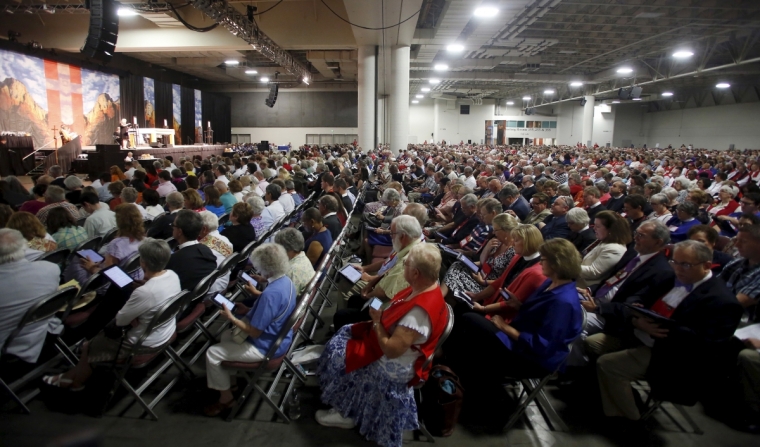Episcopal Church folds on gay marriage; 18 bishops issue dissenting 'minority report'

SALT LAKE CITY (Christian Examiner) – The General Convention of the Episcopal Church has voted to adopt liturgical and doctrinal changes to provide "marriage equality" for all Episcopalians, the church said in a statement July 1.
At its gathering in Salt Lake City, the church's House of Bishops approved the changes, followed by the approval of the House of Deputies the next day. The church will now eliminate language in its liturgy which refers to marriage as exclusively a union between a man and woman and also employ new marriage rites suitable for use by either homosexual or heterosexual couples.
The changes, however, were not without controversy. Eighteen bishops from around the country and Latin America said July 2 the church had been taken down a road they could not walk.
"As bishops of the Church, we must dissent from these actions," the statement from the dissenting bishops claimed. The small group asked for a "minority report" to be appended to the resolution opening the door to same-sex marriage.
In that report, the bishops pointed to the nature, purpose and meaning of marriage as expressed in the Book of Common Prayer. In the book – used in various editions by Anglicans and Episcopalians since the 16th century – marriage is described as "established by God in creation" and blessed by Christ in his earthly ministry.
"It signifies to us the mystery of the union between Christ and his Church, and Holy Scripture commends it to be honored by all people," the Book of Common Prayer notes.
"The union of husband and wife in heart, body, and mind is intended by God for their mutual joy; for the help and comfort given one another in prosperity and adversity; and, when it is God's will, for the procreation of children and their nurture in the knowledge and love of the Lord."
The prayer book also states:
"The nature, purpose, and meaning of marriage are linked to the relationship of man and woman. The promises and vows of marriage presuppose husband and wife as the partners who are made one flesh in marriage. This understanding is a reasonable one, as well as in accord with Holy Scripture and Christian tradition in their teaching about marriage."
The dissenting bishops said they could not ordain a marriage between two men or two women because they had pledged, according to the oath they took, to "guard the faith, unity and discipline of the church of God."
Controversy over homosexuality in the Episcopal Church is not new. In 2003, the church elected its first openly-gay bishop, Gene Robinson. Robinson, who served in Vermont, later married his gay partner. He is now retired and divorced.
Robinson's election and the subsequent push of church leaders to adopt teachings favorable to homosexuality and same-sex marriage led conservative bishops to break from the church. Many formed the Anglican Church in North America, which launched in 2009.
The bishops now, however, are hoping to remain in the church as long as they can. They noted their desire to work "in the bond of peace."
"We are committed to the Church and its people, even in the midst of painful disagreement," the bishops said in their report. "'Speak the truth in love' (Eph. 4:15). When we disagree with the Church's actions, we will do so openly and transparently and – with the Spirit's help – charitably."
According to the bishops, they will also keep their commitments to ministering to gays and lesbians in the church. They pledged to "walk with them, pray with and for them, and seek ways to engage in pastoral conversation."
The dissenting bishops also noted their allegiance to the larger, worldwide Anglican Communion and the leadership of the Church of England's See of Canterbury. That see, the authority for Anglicans worldwide, has called for "the complete cessation of the celebration of blessings for same-sex unions" and "consecrations of those living in openly gay relationships."
Ten of the bishops who signed the statement of dissent to the new same-sex marriage policies were from U.S. states, including New York, Missouri, Florida, Texas, Indiana and South Carolina. The remaining bishops were from predominately Latin American countries, such as Colombia, the Dominican Republic, Venezuela and Honduras.
The dissenting bishops said they were heartened the General Convention adopted, along with their acceptance of same-sex marriage, a statement that no minister would be coerced or compelled to perform a marriage he deemed unbiblical.